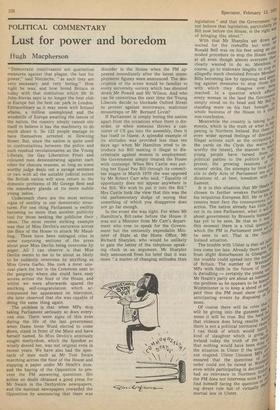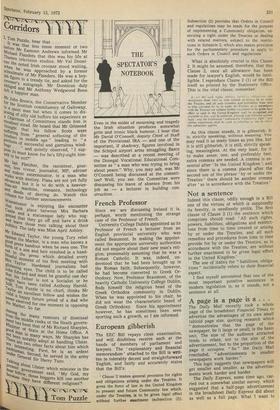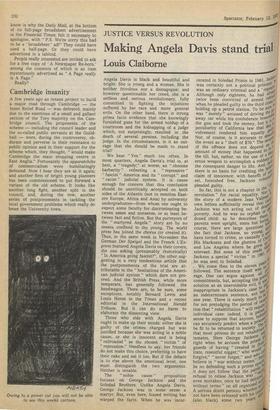POLITICAL COMMENTARY
Lust for power and boredom
Hugh Macpherson
"Democratic contrivances are quarantine measures against that plague, the lust for power," said Nietzsche, " as such they are very necessary and very boring." How right he was; and how bored Britain is today with that institution which Mr St John-Stevas says is no longer the best club in Europe but the best car park in London.
Extraordinary as it may seem with Ireland aflame, a million unemployed and the windmills of Europe awaiting the lances of the nation, the country simply cannot stir itself to believe it has the machinery to do much about it. So 122 people manage to have themselves arrested in Downing Street. But, since the nation is quite used to confrontations between the police and such rosebud revolutionaries as the Young Liberals, the Gay Liberation Front and coloured men demonstrating against each other for obscure reasons, so long as some worthy judge deals out a savage sentence or two with all the suitable judicial noises the British nation will soon return to the domestic problems of Mr George Best and the mammary glands of its more nubile young ladies.
Underneath there are the most serious signs of senility in our democratic structures. For one thing Parliament is swiftly becoming no more than another publicity tool for those seeking the publicise their ideas. The most recent striking example was that of Miss Devlin's excursion across the floor of the House to attack Mr Maudling. There have been outraged cries in some surprising sections of the press about poor Miss Devlin being overcome by anger. All I can observe is that Miss Devlin seems to me to be about as likely to be suddenly overcome by anything as Miss Greta Garbo. She took a most unusual place for her in the Commons next to the gangway where she could have easy access across the floor of the House, and whilst we were afterwards spared the smirking self-congratulation which accompanied her appearance on television, she later observed that she was capable of doing the same thing again.
The problem is that when MPs stop taking Parliament seriously so does everyone else. There were signs of this even during the life of the last government when Dame Irene Ward elected to come down, stand in front of the Mace and have herself named. So Miss Devlin's anxiously sought martyrdom, which the Speaker so wisely denied her, was not original even in recent years. We have also had the spectacle of men such as Mr Tom Swain marching across the floor of the House and slapping a paper under Mr Heath's nose, and the baying of the Opposition to prevent the PM answering questions. His action no doubt obtained a good press for Mr Swain in the Derbyshire newspapers, and the national newspapers rewarded the Opposition by announcing that there was disorder in the House when the PM appeared immediately after the latest unemployment figures were announced. The description of the scene would be familiar to every university society which has shouted down Mr Powell and Mr Wilson. And who can be censorious the next time the Young Liberals decide to blockade Oxford Street to protest against motorways, malicious mousetraps or Mr Bernard Levin?
If Parliament is simply boring the nation apart from the occasions when there is disorder, or when someone throws a cannister of CS gas into the assembly, then it has itself to blame. A splendid example of its attitudes was provided less than ten days ago when Mr Hamilton tried to introduce his Bill making it illegal to discriminate against women in employment: the Government simply treated the House with contempt. When Mrs Castle was putting her Equal Pay Bill through its committee stages in March 1970 she was opposed by Mr Robert Carr who said, "Equality of opportunity does not appear anywhere in the Bill. We wish to put it into the Bill." Mrs Castle took the view that this was the old parliamentary dodge of saying that something of which you disapprove does not go far enough.
In the event she was right. For when Mr Hamilton's Bill came before the House it was not a Minister from Mr Carr's department who rose to speak for the Government but the eminently expendable Minister of State at the Home Office, Mr Richard Sharpies, who would be unlikely to gain the better of the telephone speaking clock in an argument. Mr Sharpies duly announced from his brief that it was more "a matter of changing attitudes than legislation" and that the Government "(I° not believe that legislation, particularly the Bill now before the House, is the right WO of bringing this about."
With that Mr Sharpies sat down waited for the reshuffle but soon Ronald Bell was on his feet using an °11moded procedure to stop the House votinge at all even though almost everyone ther„f clearly wanted to do so. Members, :e course, go to elaborate lengths to stop t's, allegedly much cherished Private MerilheL. Bills becoming law by opposing and sPe; ing against measures to stop those 13.I'g with which they disagree ever betilled reached. In a question ' which affec4 every woman in the land the Governnl`o, simply stood on its head and Mr Fiell,he standing mute on his feet brought whole business of the House to a stle non-conclusion.
Meanwhile the country is taking streets, which is the truth of what is P;re pening in Northern Ireland. But theretept even wider spread feelings of diac°11' of Illegal actions such as the occupation4o, the yards on the Clyde (no matter brIld worthy the intent), the manner in W young people have turned fr°111 yet political parties to the politics of s protest, the growing tensions miners' strike, the attempts by local cils to defy Acts of Parliament are a"For dications of, at best, boredom with liament.
It is in this situation that Mr Ilet chosen to further weaken Parliarnell5e his iniquitous European Bill. He or hisf cesscirs must face the consequences °,11tet action. The nation already has est in its own Parliament, what it WI.,cridj about government by Brussels burea% has yet to be seen. Be that as it 111,3;0 this moment there is a vital questri°t which the PM in Parliament must a',,ritie0 be seen to act. That is the 140' Ireland situation. The trouble with Ulster is that a111 ives come too late. Already there are tiO: from slight disturbances in Glasgovii'vlail; the trouble could spread into the ni3iroi'l of Britain. The number of Westr„rino, MPs with faith in the future of „ • is dwindling — certainly the young ste Mr Heath's party are about as intereself! the problem as he appears to be hitri,44 Westminster is to keep a shred of s'ilge pect then the PM must show c01•1„rf Sc°1 manotnictipating events by disposing "' Of course there will be cries t will be giving into the gunmen foci; sense it will be true. But the haru,ittlo that violence does bring result5. t•Pse there is not a political territorial catti.fyl,, I can think of which would jusj1011 kind of slaughter which is goirle10' Ireland today the truth of the 01;01? that nothing would have been cl°11hies the situation in Ulster if the troll alo';, not erupted. Ulster Unionist MPS ipte: ensured that the questions of 00: order could not be raised at Wes s ' even while participating in decisiorliol had no relevance in Northern jr the PM does not intervene soon her I find himself facing the question po ing direct rule but of virtually martial law in Ulster. COrridorS I, Torn Puzzle, hear that . . • can the noted Irish crooner stood waiting, tlethora of successful and garrulous windbefore Mr Earnonn Andrews informed Mr Thames television studios. Mr Val Dooni,,.Mr John Brewis, the Conservative Member P°sirig of silly old buffers his experience as excellent stead. He heard that Mr Grimond Michael Flanders that this was his life at When seho he was approached by a former tor the Scottish constituency of Galloway, a Chairma i suffering.from "general softening of the intellect in middle age" leading to s:_if is he not)" '80 figure in a trendy tie, and asked for the crooner's autograph. Mr Doonican duly °, d and Mr Anthony Wedgwood Benn is a quiet man but when it comes to disleft a happier man. th°aght that his fellow Scots were blige It was that less tense moment or two olniate of Mr Flanders. He was a boy must know for he's fiftyn of Committees stands him n and quietly observed, "I sup eight him 'a!' Ian Fletcher, the raconteur, gour/Pet, bon viveur, journalist, MP, aPd adviser rodent exterminator, is a man who Walks with destiny. Plans are not yet fully ,advanced but it is to do with a heavier aran-air machine, romance, technology id deeds of derring do. Watch this tolutrin for further announcements. Westminster is enjoying the encounter t_hat CastleLook place between Mrs Barbara and a statuesque lady who sug 8ested that they go off and have a drink and leave those men talking about their Poli tics. The lady was Miss April Ashley. r Edward Taylor, the young To rebel against Tory the Market, is a man who knows a re birt,"cif ss handout when he sees one. The out a son and heir resulted in a hand } t° the press which detailed every ul moment of his first meeting with TaYlo ghstem r. Hardened' journalists had John t, ng eyes. The child is to be called that‘vard and must be grateful one day Tht "is father is not a Socialist or he strt have been called Anthony Harold. .ra j, Tom Puzzle is no churl, thinks Mr ehrkitir an excellent fellow and wishes the neve-r a haPPy future proud of a dad who the swerved for one moment in opposing Market. So far. Amon fron4 the many rumours of dismissal men mi,ste 'le middle ranks of the Heath governhas been that of Mr Richard Sharpies, L r goer, of State at the Home Office. A Man • Pot he in many ways, Mr Sharpies has Th, en notably adept at handling Ulster. are two Other facts about him which IrLaes chtinteresting. First, he is an ardent uhtiet Tan. Second, he served in the army kieneral Sir Harry Tuzo. Talking Present about Ulster: which minister in the dear fell government said, ' My God, my bee civ,/, those buggers kill one another a"e theY have different religions'? Even in the midst of mourning and tragedy the Irish situation produces somewhat grim and ironic black humour. I hear that Mr David O'Connell, deputy Chief of Staff of the Provisional IRA — and one of the important, if shadowy, figures involved in the Schipol airport arms smuggling fiasco — was described at a recent meeting of the Donegal Vocational Educational Committee as "a man who was trying to bring about peace." Why, you may ask, was Mr O'Connell being discussed at the committee? Well, you see. the Committee were discussing his leave of absence from his job as — a lecturer in building construction.
French Professor
Since we .• are discussing Ireland it is, perhaps, worth mentioning the strange case of the Professor of French. University College Dublin appointed as its Professor of French a lecturer from an English provincial university who was called Beaumont. In making the appointment the appropriate university authorities did not enquire about their new man's religion, presumably assuming that he was a Roman Catholic. It was, indeed, understood that he had been brought up in the Roman faith. Subsequently, however, he had become converted to Greek Orthodoxy. Now, Professor Beaumont, of the heavily Catholic University College Dublin, finds himself the religious head of the Greek Orthodox community in Dublin. When he was appointed to his chair, he did not wear the characteristic beard of Greek Orthodoxy. Since his appointment however, he has sometimes been seen sporting such a growth, so I am informed.
European gibberish
The EEC Bill repays close examination, and will doubtless receive such at the hands of members of parliament and lawyers. The 'explanatory and financial memorandum' attached to the Bill is written in tolerably decent and straightforward English, and fairly and accurately states that the Bill's: Clause 2 makes general provision for rights and obligations arising under the Treaties. It gives the force of law in the United Kingdom to present and future Community law which, under the Treaties, is to be given legal effect without further enactment (subsection (I)). Subsection (2) provides that Orders in Council and regulations may be made for the purpose of implementing a Community obligation, exercising a right under the Treaties or dealing with related matters, subject to the restrictions in Schedule 2, which also makes provision for the parliamentary procedure to apply to such Orders in Council and regulations.'
What is absolutely crucial is this Clause 2. It might be assumed, therefore, that this Clause 2, once all allowance has been made for lawyer's English, would be intelligible. I reproduce Clause 2 (1) of the Bill itself as printed by the Stationery Office. This is the vital clause, remember.
2.-,H All such riOus. rthfi*iiion., and restrictions from time to time created or arising by or under the Treaties, and all such remedies and procedures from time to time pro‘ided for by or under the Treaties. as in accordance with the Treaties are without further em:ctinent to he given legal effect or used in the United Kingdom shall he recognised and available in law, and he enforced. allowed and followed accordingly : and the expression "enforceable 0,11111l171IN right " and similar expressions shalt be read as referring to one to whia this subsection applies.
As this clause stands, it is gibberish. It is, strictly speaking, without meaning. You may read it as many times as you like, btit it is still gibberish, it is still, strictly speaking, meaningless. At the very least, for it to make sense, one, and preferably two, extra commas are needed. A comma is essential after In the United Kingdom '; and since there is a comma placed after the second use of the phrase by or under the Treaties' there should be another comma after as in accordance with the Treaties.'
Not a sentence
Indeed this clause, oddly enough in a Bill one of the virtues of which is supposedly its brevity, is needlessly prolix. The first clause of Clause 2 (1) the sentence which comprises should read: All such rights, powers, liabilities, obligations and restrictions from time to time created or arising by or under the Treaties, and all such remedies and Procedures from time to time provide for by or under the Treaties, as in, accordance with the Treaties, are without further enactment to be given legal effect in the United Kingdom.' The use of italics for " liabilities, obligations " incidentally refers to their financial aspect. I find myself astonished that one of the most important putative sentences in modern legislation is, as it stands, not a sentence at all.
A page is a page is a . . .
The Daily Mail recently took a whole page of the broadsheet Financial Times to advertise the advantages of its own small tabloid page size, quoting research which " demonstrates that the page of the newspaper, be it large or small, is the basic unit. The size of the audience attracted tends to relate, not to the size of the advertisement, but to the proportion of the page it occupies. " So " the Daily Mail concluded, "advertisements in smaller newspapers work harder." This logic suggests that newspapers will get smaller and smaller, as the advertisements work harder and harder. The Daily Express, some time ago, carried out a somewhat similar survey, which suggested that a half-page advertisement in the broadsheet Daily Express did about as well as a full page. What I want to know is why the Daily Mail, at the bottom of its full-page broadsheet advertisement in the Financial Times, felt it necessary to apologise, with " P.S. We're sorry this had to be a ' broadsheet ' ad!" They could have used a half-page. Or they could have advertised in a tabloid.
People really interested are invited to ask for a free copy of 'A Newspaper Re-born,' among the contents of which is an item mysteriously advertised as "A Page really is A Page."
Really?
Cambridge insanity
A few years ago an insane project to build a major road through Cambridge — the Inner Relief Road — was defeated, mainly due to the exertions of a small and gallant section of the Tory majority on the Cambridge council. The proponents of the scheme — including the council leader and the so-called public servants at the Guildhall — were, during the controversy, obdurate and perverse in their resistance •to public opinion and in their support for the scheme which, they thought, "would make Cambridge the main shopping centre in East Anglia." Fortunately the apparatchilzs of commercialism were humiliatingly defeated. Now I hear they are at it again; and another firm of bright young planners has been commissioned to put forward a variant of the old scheme. It looks like another long fight, another split in the council, and, during the row, another series of postponements in tackling the local government problems which really do beset the University town.












































 Previous page
Previous page